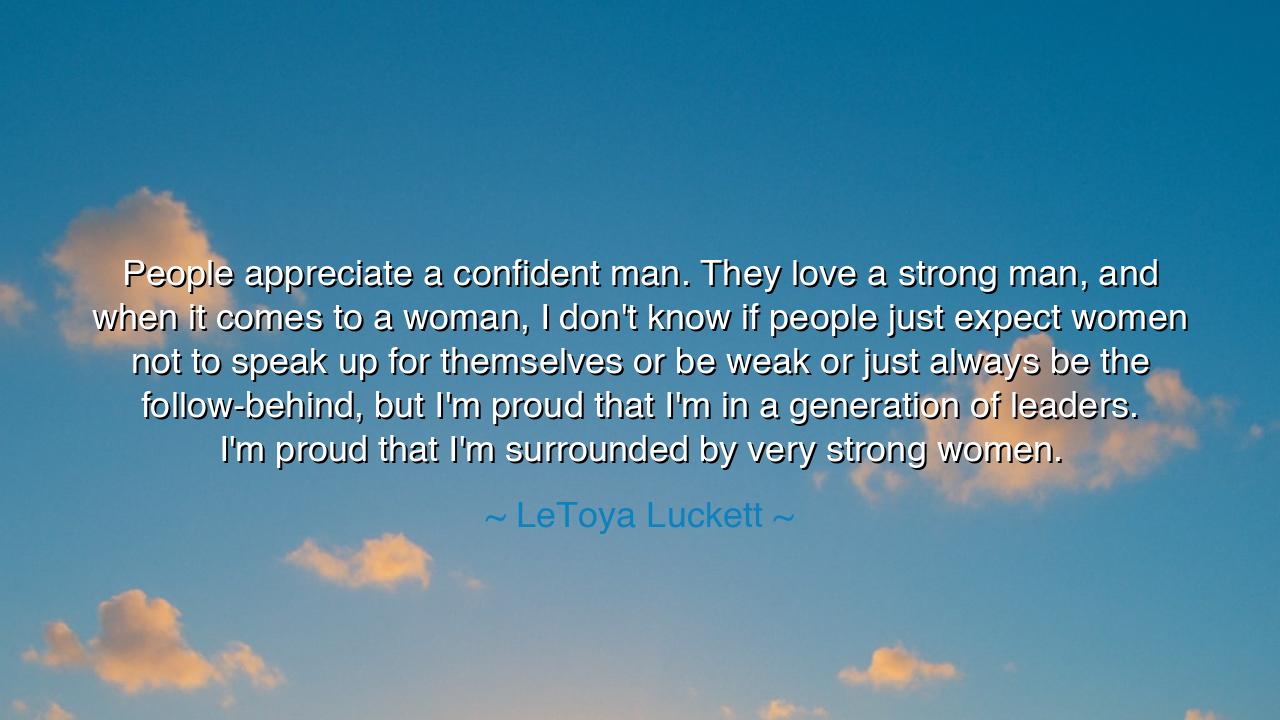
People appreciate a confident man. They love a strong man, and
People appreciate a confident man. They love a strong man, and when it comes to a woman, I don't know if people just expect women not to speak up for themselves or be weak or just always be the follow-behind, but I'm proud that I'm in a generation of leaders. I'm proud that I'm surrounded by very strong women.






The words of LeToya Luckett burn with pride and truth: “People appreciate a confident man. They love a strong man, and when it comes to a woman, I don't know if people just expect women not to speak up for themselves or be weak or just always be the follow-behind, but I'm proud that I'm in a generation of leaders. I'm proud that I'm surrounded by very strong women.” Here she names the ancient double standard—that strength in men is praised, while in women it is often feared or dismissed. Yet she also proclaims a new dawn, where women no longer shrink into silence but rise as leaders, equal in courage and unmatched in resolve.
The ancients, too, wrestled with this tension. In many lands, women were commanded to be silent, their voices drowned by the roar of men. Yet even then, there were those like Deborah, the prophetess of Israel, who judged her people with wisdom and led them into victory. Her voice was not a whisper behind a man but a trumpet that called forth armies. Luckett’s words are an echo of Deborah’s truth: that the time of silent women has always been false, and that leadership is not bound by gender but by spirit.
Consider also the story of the suffragettes of the early twentieth century. The world expected them to be meek, to follow quietly behind husbands and fathers. Instead, they stood boldly in the streets, endured prison, hunger strikes, and ridicule, until the right to vote was won. Their defiance was not weakness but strength unshaken, and it paved the way for the generations of women Luckett celebrates—those who lead, who speak, who refuse to be hidden.
Luckett’s declaration is not only personal pride but a generational triumph. She sees herself encircled by strong women, no longer isolated or tokenized, but rising together like a chorus of power. In their unity, they embody a new order, where women are no longer judged for stepping forward but praised for carrying the mantle of leadership. This is the fulfillment of centuries of struggle, the breaking of chains, the lifting of voices.
Let the generations remember: true strength does not belong to men alone. It belongs to every soul that dares to speak truth, to lead with courage, to stand unbowed. Luckett’s words are both celebration and summons, a reminder that a new age has dawned, where women no longer walk behind but stride at the front, side by side with men, shaping the destiny of their people.






GTPhat giau ten
LeToya Luckett’s quote emphasizes the shift happening in leadership, where more women are confidently stepping into powerful roles. But how much of this progress is visible in the mainstream? While we may be surrounded by strong women, are they still being marginalized in some ways, especially in industries or countries where gender inequality is more deeply rooted? How do we ensure that these women leaders are fully recognized and celebrated?
TTranichhuy
It’s interesting to hear Luckett’s take on women being expected to be ‘weak’ or ‘followers.’ How do we challenge the notion that women need to be less assertive to be likable or accepted? Are we truly moving toward a future where women are seen as equals in leadership roles, or are these old stereotypes still deeply ingrained in how we evaluate women’s strength and leadership ability?
QNNguyen Quynh Nhi
LeToya Luckett’s perspective on leadership reflects a broader cultural issue where women must often defy traditional expectations to be seen as strong or capable. The idea that society expects women to be weak or follow rather than lead is concerning. How can we break down these stereotypes and normalize women’s voices in leadership positions? What would it take for women to be celebrated for being assertive and confident, just as men are?
TTTran Trang
I love how LeToya Luckett proudly acknowledges her generation’s strong women leaders. However, this quote also made me wonder: how much longer will it take for society to fully embrace women in leadership without hesitation? While there are more women in leadership roles today, do we still see them as strong leaders, or do we still judge them based on outdated gender norms? How can we speed up this cultural shift?
LKLien Kim
Luckett’s comment challenges traditional gender roles by highlighting how women are often not expected to speak up or assert themselves in leadership positions. It makes me think about how much women still have to prove in spaces dominated by men. But, can we truly change these expectations without societal pushback? How do we create more space for women to lead without facing the stereotypes that hold them back?